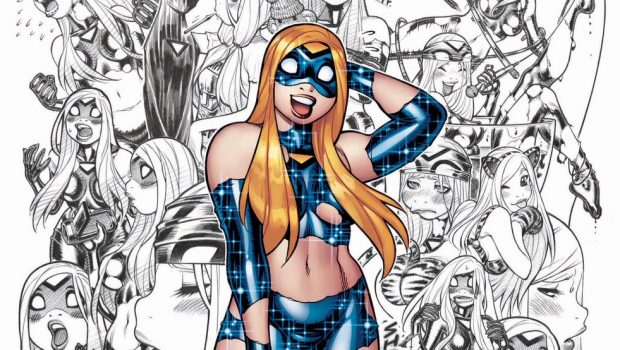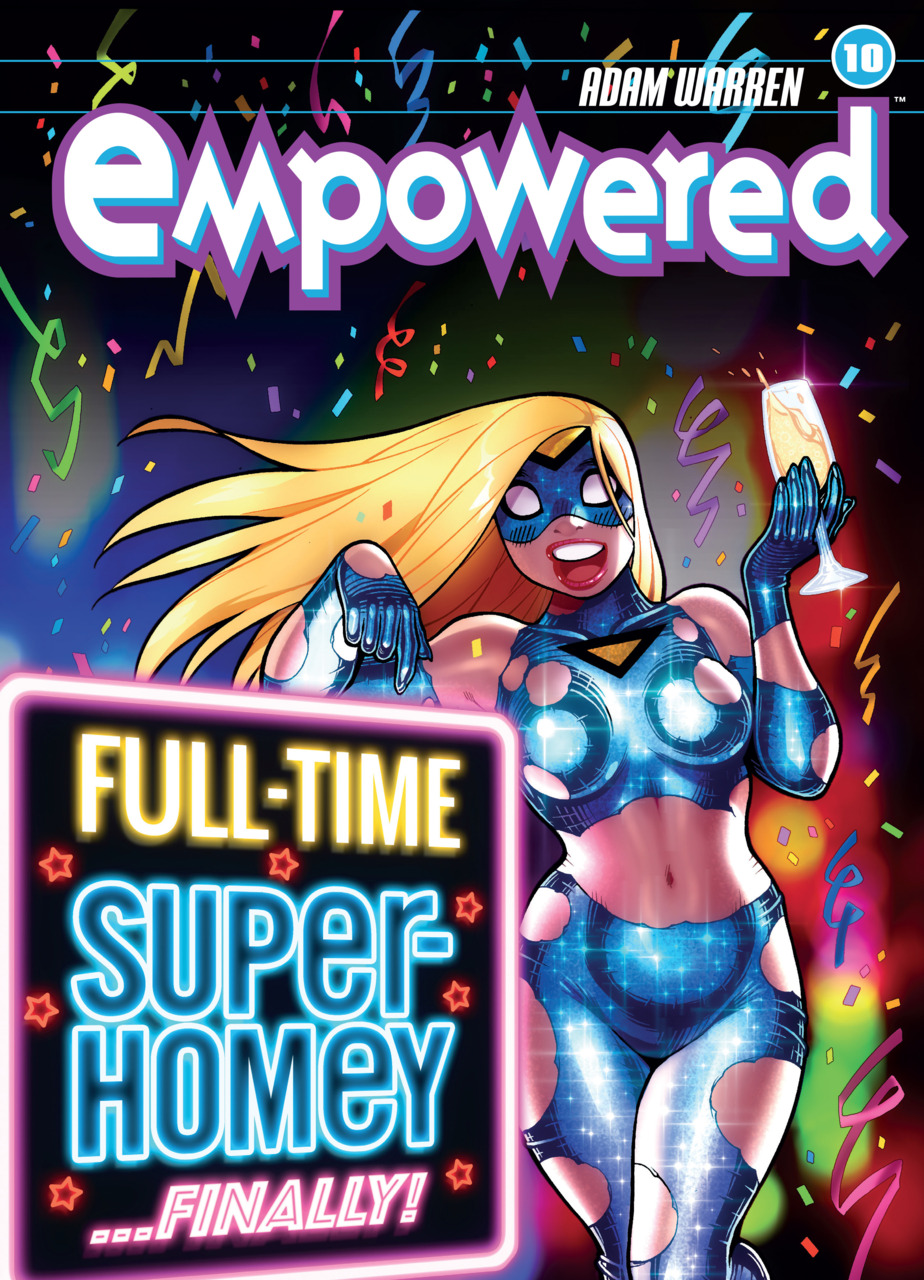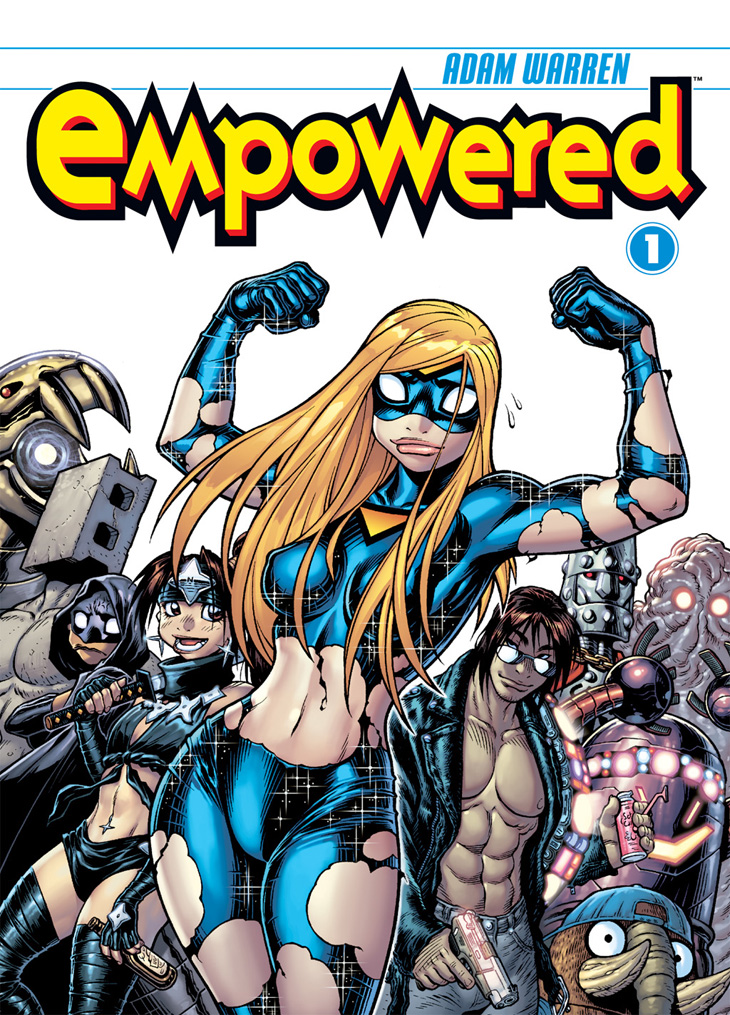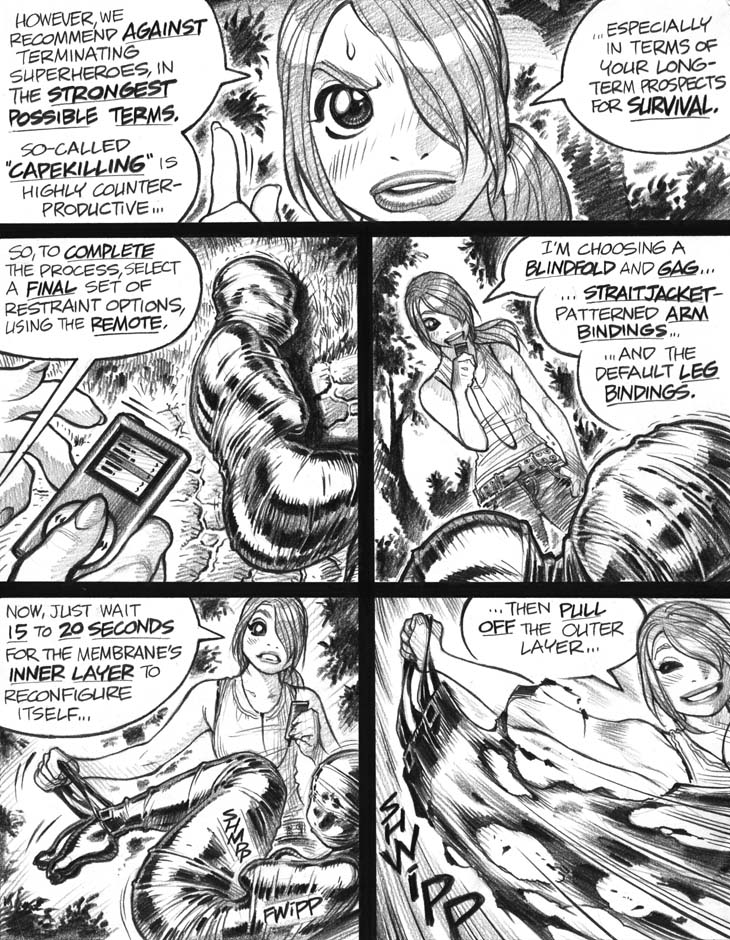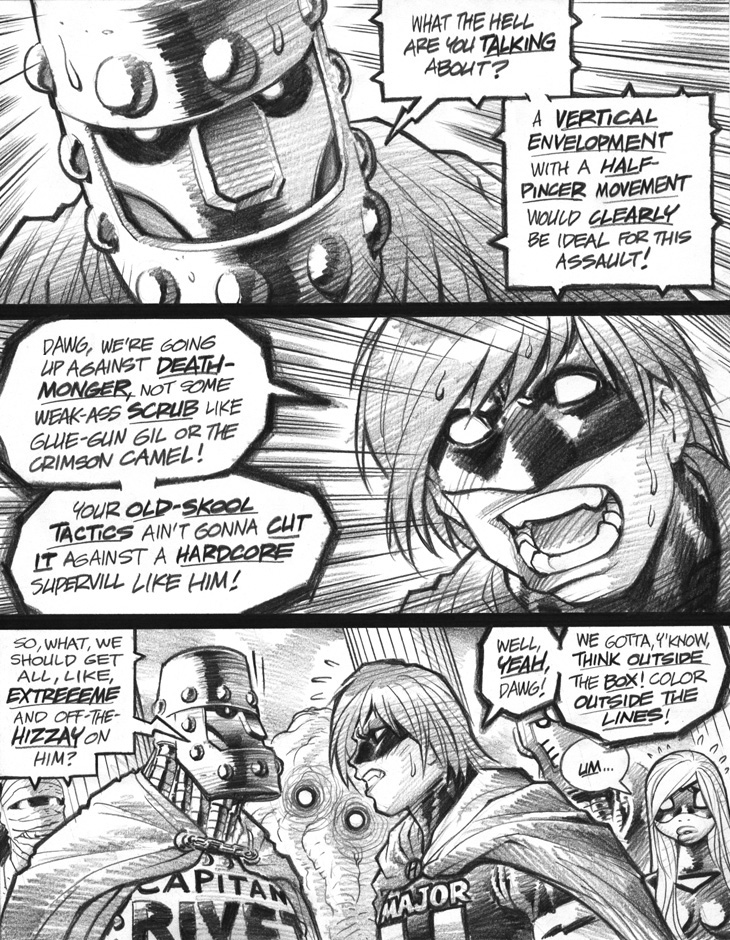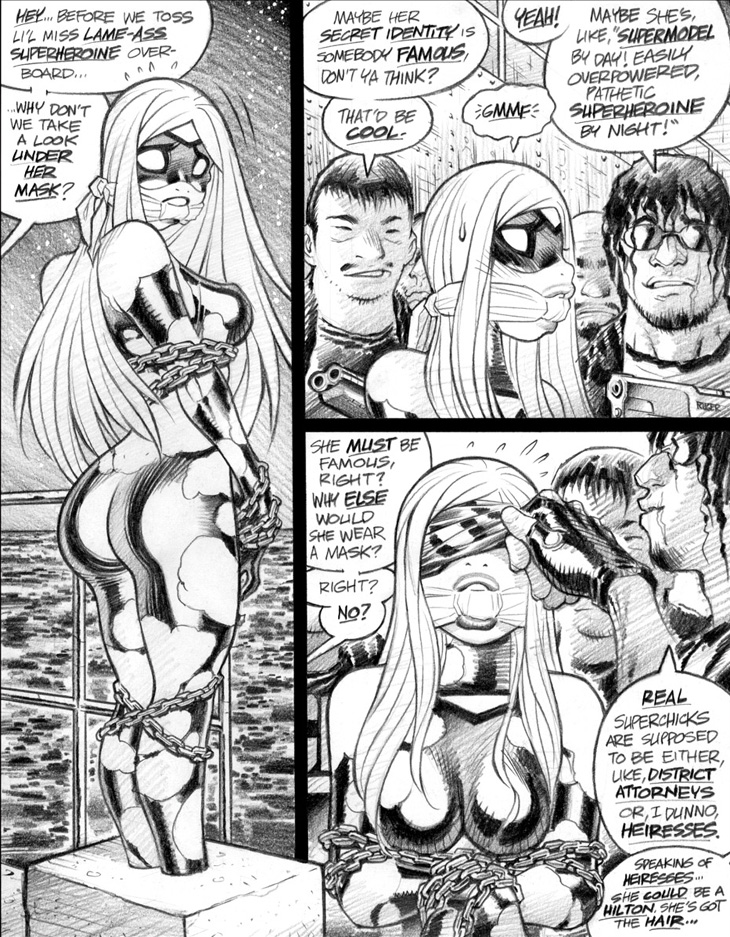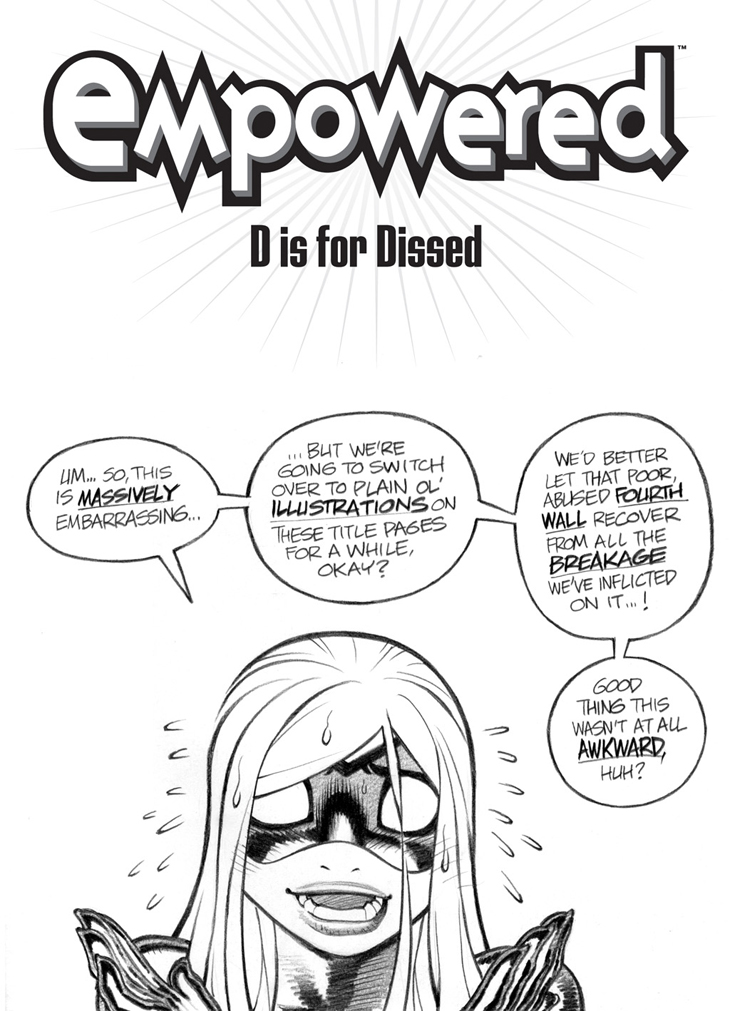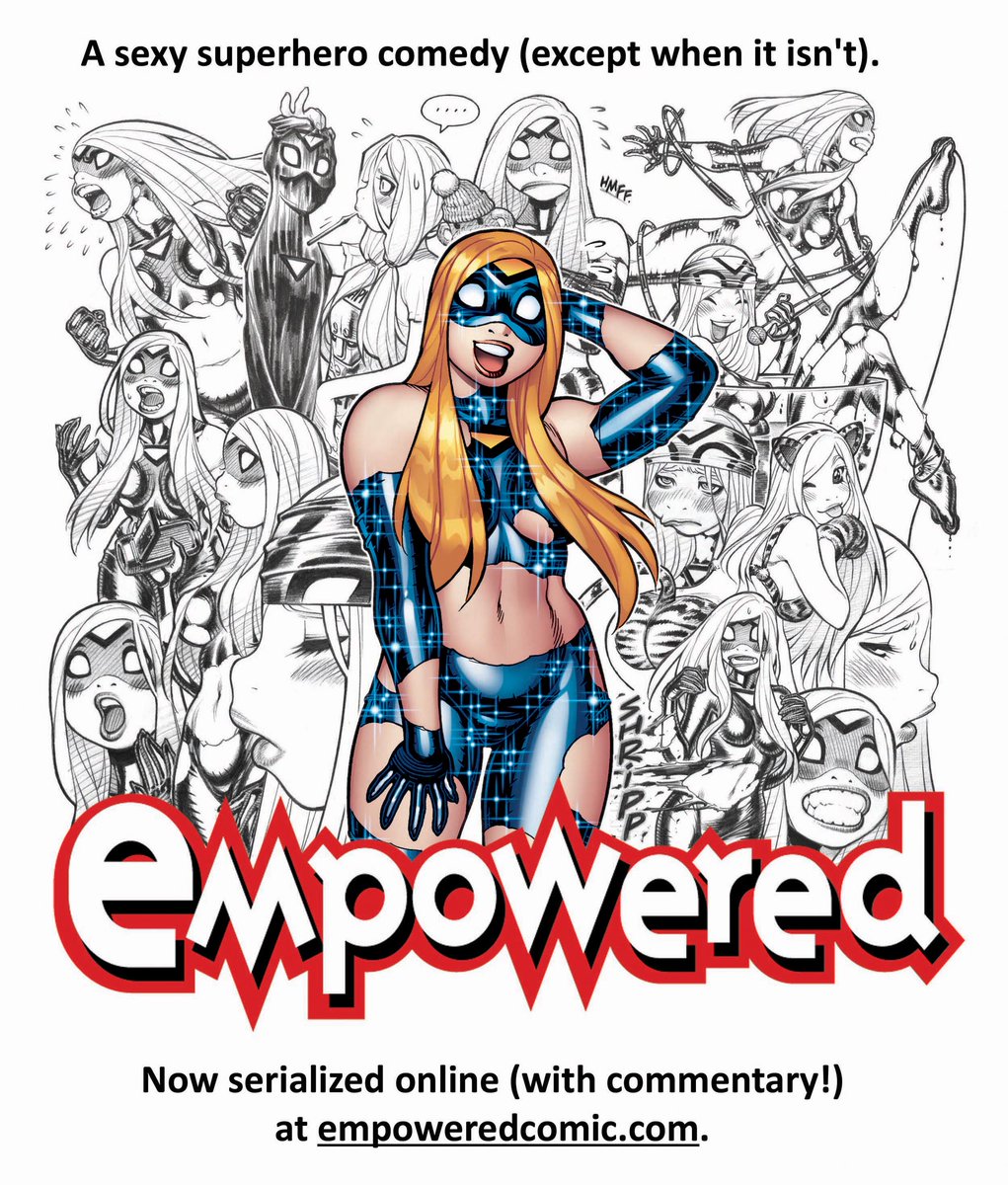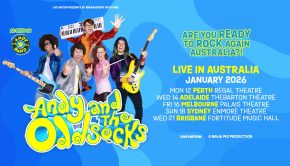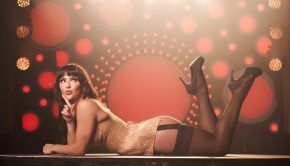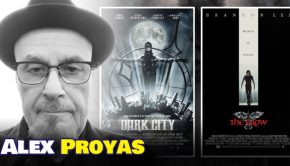AN EMPOWERING CHAT WITH ADAM WARREN
We decided to catch up with the wonderfully talented artist and writer Adam Warren (Empowered, Livewires), where he talks to us about his sexy superhero comedy series, Empowered , published by Dark Horse Comics, and a whole lot more!
Empowered has its roots in manga with The Dirty Pair. At what point did the work on The Dirty Pair lead you onto the path of Empowered?
Well, my years writing and drawing an original, English-language comic based on SF writer Haruka Takachiho’s characters The Dirty Pair—best known over here for their various old-school anime iterations—led to my current-day work in three main ways:
A) When I drew Dirty Pair, I used a complicated and maddeningly time-consuming production technique that kicked off with tight, detailed layout pages and then ran through the slow, repetitive, grinding work stages of finished pencils, full-sized inks, lettering, then screentones or color guides. Ah, but what ticked me off was that everyone who saw my initial layout pages preferred their scribbly energy and liveliness to my finished comic pages, despite the hundreds of g-d work hours I poured into the final product. At some point, though, a sadly belated epiphany dawned in my addled brain: Hey, what if I did a comic based solely on my first-draft, pencil-scrawled layout pages? And that’s what most of Empowered’s original artwork wound up being—quickly drawn pencil art on cheap copy paper, banishing all the slow, tedious, painstaking stages of my old work technique in the process. Begone, foul inking! Take a hike, giant-sized original pages! I now work lean, fast, and dirty—er, in the “messy cloud of graphite” sense of “dirty,”, that is.
B) Despite all the fun I had working on Dirty Pair and, later, for DC and Marvel as a writer and artist, I eventually realized that I needed to work on a fully creator-owned comic series sooner rather than later. One of my key influences, the great mangaka Kenichi Sonoda, told me long ago that I should do some wholly original material—but did I listen? Alas, I did not, as his hard-earned wisdom wouldn’t strike home with me for another decade or more. (Ouch!) Nowadays, I’m hoping that a reprint of my long-unavailable Dirty Pair work might someday be possible, but I’ve clearly paid a bit of a price for sinking so much time into beloved characters that, in the end, are out of my control. Cue the “hapless shrug” emoticon, folks: ¯\_(ツ)_/¯
C) Plus, hey, let’s face it: Writing and drawing the action-packed, humor-intensive adventures of The Dirty Pair’s revealingly costumed badass heroines was excellent practice for writing and drawing the action-packed, humor-intensive adventures of Empowered’s revealingly costumed badass heroines.
I’m relatively new to Empowered, but so far it reads as a send-up of traditional superhero tropes. Was this one of the main ideas behind the comic or has it evolved to that point from its original concept?
First off, for new readers, here’s my one-sentence summary of the series: Empowered is a “sexy superhero comedy”—except when it isn’t—about the trials, tribulations and body-image issues of a struggling young “D-list” superheroine.
As for the series’ evolution, I should confess the arguably sordid nature of Empowered’s literally and figuratively “sketchy” origins. Over a decade ago, at a time when my career in comics seemed pretty much over, I took on some rather dubious commissioned sketches to make ends meet. A recurring theme among those commissions was, well, scantily clad superheroines as trussed-up “damsels in distress.” These illustrations grew boring for me very quickly, so I started switching them out with one- or two-page—ahem—“stories” about how much life as a bondage-prone superheroine must surely suck. These brief, goofy anecdotes soon took on a life of their own, rapidly growing ever longer and more complex, adding an ever-expanding cast of colorful characters until these throwaway-joke episodes magically bootstrapped themselves in an honest-to-gosh real graphic-novel series, folks! With good—if not occasionally glowing—reviews and everything, I swear!
What compelled me to develop the series, though, wasn’t so much the idea of sending up hoary old superhero tropes as exploring what their consequences on a sympathetic, hopefully relatable relatable protagonist might be. Most superheroines seem unconcerned or, at most, mildly acerbic about wearing wildly revealing costumes. Well, what if someone with crippling insecurities and body-image issues had to parade herself around in a beyond-skin-tight “supersuit?” Most superheroines seem to shrug off story-driven “damsel in distress” incidents with few ill effects. What if someone, already struggling with low self-esteem, found these embarrassing episodes to be intensely humiliating, if not downright heartbreaking? Most superheroines seem to enjoy a positive work environment within the superteams they join. What if, like Emp, you landed the supposed “job of your dreams,” only to find that your workplace is obnoxiously hostile and your cape-clad coworkers are douchebags, morons, or venomous witches?
Over the course of a dozen-odd volumes and roughly 2500 pages, the series has evolved to ask many more questions about superheroes, through the means of an ever-burgeoning cast of colorful characters. Once-omnipotent demonlords condemned to life on a coffee table! Hard-drinking ninjas on the run from their daddy issues! Grieving sorceresses battering down the gates of hell to rescue damned lovers! Undead, decaying heroes whose bodies are mortal, but whose superpowers are not! Surreal, pandimensional hospitals packed with ailing aliens and sickbed-bound suprahumans! All this and more in Empowered, folks!
Do you ever find yourself struggling to walk the fine line between satire and sexism in Empowered? Obviously, Emp is highly sexualized, but I imagine some people miss the notion that you are playing with the stereotypes of female hero characters. Do you get into much trouble for it? If so, how do you deal with it?
Might be the case that most people who would likely be hostile to Empowered dismiss the series out of hand without ever reading it. If someone actually bothers to read one 200-page installment—let alone nine or ten more of ’em—telling the story of an unlucky but plucky and relatable superheroine, I assume they’d eventually grasp that the series’ point is to humanize an otherwise dismissible stereotype, that of the generic “sexy superheroine wearing an embarrassing costume.”
No doubt some folks would be uncomfortable with the rich vein of contradictions running through Empowered. Can a series truly satirize exploitive tropes while simultaneously indulging in them? Am I making fun of these cliches, or am I making fun of myself for supposedly doing so? Or am I recursively making fun of the idea that I’m making fun of myself for making fun of such cliches? In fact, I never technically claim to be doing anything of the sort—I just recite my well-worn line about how the series is “a sexy superhero comedy,” and go back to work. Gotta say, many other people have offered deeper and more insightful analyses of Empowered than I could ever muster myself, so why bother? I’ll just stick to writing and drawing the darn series.
Along these lines, one of the running jokes in Empowered is so-called “Metatextual Emp,” who pops up in the chapter breaks to break the fourth wall and complain directly to the reader. The further joke, here, is that a sensitive, insecure, progressive person like Emp wouldn’t be particularly thrilled about the problematic nature of the book she inhabits. Well, sorry ‘bout that, Emp.
The first Empowered comic I read was Empowered and the Soldier of Love, and it grabbed me from the start with its openness and matter-of-fact depiction of sexuality. I found it refreshing and surprising! Do you tackle subject matter like this because they are considered topical or is it more of something that comes up during brainstorming as a potential “fun twist”?
Well, to be honest, the miniseries-format Empowered and the Soldier of Love offers a deliberately toned-down version of the openness and matter-of-fact depiction of sexuality seen more explicitly—but not all that explicitly!—in the Empowered graphic-novel series. Because I’m not writing mainstream, corporate-IP “capes” with all the limitations that implies, I embraced the idea of dealing with sexuality in the superhero world in both healthy and not-so-healthy ways. “Healthy” in the Empowered context would mainly describe our heroine’s loving but occasionally kinky relationship with her former “Witless Minion” boyfriend. “Not so healthy” examples would include superpowers acquired through STDs, capes writing erotic fanfiction about themselves, and supervillains struggling with chloroform fetishes. (Yikes!)
In fact, the regular series is shrinkwrapped and forbiddingly labeled “FOR MATURE READERS” not because of nudity or profanity—there isn’t any, by the way—but because it’s a superhero book, with all of the arguably irrelevant cultural assumptions that implies. If Empowered were a goofy, sexy comedy entirely without the telltale capes and masks, the series might well not be shrinkwrapped or labeled. Oh, well.
Besides The Dirty Pair, what other anime or manga influenced your style?
Well, in the earliest days decades ago—ouch!—my key “first-wave” influences were an fairly eclectic assortment of early-90s mangaka. Lemme rattle off a few:
Rumiko Takahashi (Urusei Yatsura, Maison Ikkoku): Hilarious, off-the-wall comedy and rich emotional depth—essentially my model for Empowered, though I needed (many) years of practice to truly fulfill that promise, as I am a tragically slow learner.
Otomo Katsuhiro (Akira): Mind-blowing, epic work, shattering all my preconceptions—KRASHH!—about what could be done with the medium.
Kenichi Sonoda (Gunsmith Cats), Shirow Masamune (Appleseed, Ghost in the Shell) and Yukito Kishiro (Battle Angel Alita): Wild action, cute girls, and heavy-duty science fiction ahoy! And I can get paid to do this? (Well, sometimes I can get paid, it turns out.)
Tatsuya Egawa (Be Free!, Tokyo University Story) and Kazushi Hagiwara (Bastard!!): Though utterly different creators, both expanded my horizons yet again, demonstrating to me how manga’s gift of expansive pagecount could be used for bold, wild, innovative storytelling, as opposed to the cramped restrictions of the conventional, monthly-issue-based American comics format. (And that’s one reason why Empowered saw print as—ahem—a “graphic-novel” series of big, brawny, bullet-stopping trade paperbacks of 200 pages or more.)
Nowadays, my contemporary mangaka influences include Moyoco Anno (Sakuran), Hiroaki Samura (Blade of the Immortal), Kaoru Mori (A Bride’s Story), Tetsuro Ueyama (Solevision Mitsuyoshi, Tengu Girl) and the wonderful Naoki Urasawa (20th Century Boys, Pluto)—and a dozen or more others, with new influences arriving seemingly every other day. So damn inspiring, y’know? While the American comics field is my workplace, gotta admit that I find manga to be “the real comics,” as far as I’m concerned. (Shh, please don’t tell anyone, or the American comics field might get upset.)
Also gotta admit that anime was important to me very early on in my career—nay, my artistic journey, to be more pretentious—as, after all, I first encountered Dirty Pair as a TV series. But after a decade or so, I focused pretty much entirely on manga, which I found far more relevant to the not-dissimilar work I do for a living. Ah, but every now and then I do still encounter an anime that truly floats my proverbial boat—such as, say, the Big Ideas and Big Emo of Puella Magi Madoka Magica, which was very relevant indeed to the sweeping, emotionally charged story arcs that bear fruit later on in Empowered. (Yeahp, it’s true, I’m all about the fruit-bearing, folks.)
How many versions of Emp were there before you settled on the final look? I really enjoy seeing the “working pages” in comics, and I’m curious to know the real origin and process behind her.
Visually, at least, Emp sprang to life pretty much, ah, fully formed in the very first page, as I was wanly attempting to slightly subvert a generic “damsel in distress” commissioned sketch into a marginally more interesting story from a nameless superheroine’s point of view. Her appearance was straightforward and fairly generic—conventionally attractive blonde superheroine in a tattered and revealing “supersuit.”
Writing-wise, though, her characterization rapidly developed as one story followed another in rapid succession, and Emp blossomed from an unremarkable pin-up subject to a very specific and, I hope, rich and complex character.
On this front, I should hasten to add that Empowered is now being serialized as a webcomic, starting from the beginning of the series and rolling on through vol. 3 at present. Every single page of the webcomic features extensive—if not frickin’ exhaustive—commentary on the story and art, and natters on at great length about the creative process involved in the series’ genesis. (And berates my early choices rather incessantly, alas, as the intervening decade or so has not always been kind to my storytelling decisions.) You’ll laugh; you’ll cry; you’ll reply “tl;dr” in the Comments section! The serialization starts here:
http://www.empoweredcomic.com/comic/volume-1-page-1
This is a completely clichéd question, but do you have any aspirations of Empowered becoming a movie or possibly a TV show? Let’s say, Netflix presents: Empowered!
In fact, 5 or 6 years ago, Empowered was pitched as a live-action TV show to MTV—unsuccessfully, as you might have guessed! Really, I got lucky, though, as I strongly suspect that the potential TV series would have ended up bearing little or no resemblance to the original comic if it had indeed gone ahead. Ah, but at the time I was blinded by greed—not for any theoretical “option money,” but for the unlikely opportunity for my obscure little series to do an end-run around other, better known fictional superheroines.
See, this failed pitch took place just before the modern, ah, “superheroine renaissance” at Marvel and DC—as in, Batgirl of Burnside, Ms. Marvel, the Unbeatable Squirrel Girl, Captain Marvel and so on. Back then, I saw very little of interest being done with mainstream superheroines either in comics or media, so I was tickled to no end by the idea that my dubiously perceived and oh-so-problematic heroine might possibly vault to new arenas of pop-culture exposure before her far more famous but sadly neglected Big Two equivalents. Alas, no.
More recently, DC’s TV series Supergirl and cinematic Wonder Woman have gone to places I’ve tried to explore with Emp—that is, depicting a superheroine as warm, compassionate, inclusive and funny, as opposed to a remorseless, humorless asskicker, without making her a boring, blandly flawless “goody-two-shoes.” That probably doesn’t help the unlikely chances of Empowered ever being optioned—or does it? No idea, really.


